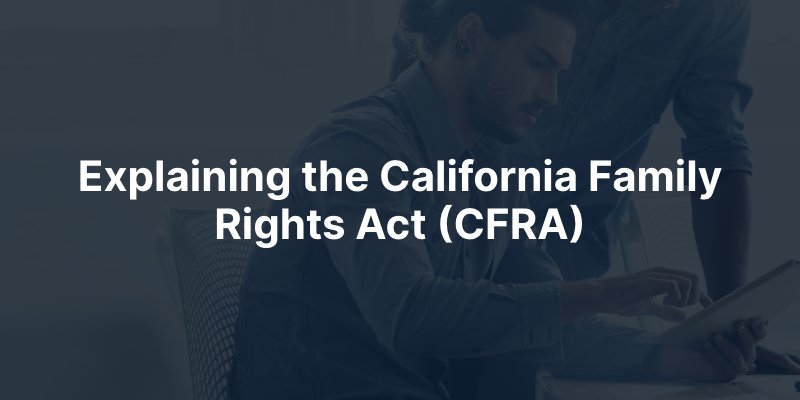California offers many benefits to workers in the course of their employment. One such protection is governed by the California Family Rights Act, also known as the Moore-Brown-Roberti Family Rights Act or CFRA. CFRA allows workers to take a leave of absence from their role due under specific circumstances.
CFRA leave is job-protected, meaning an employee can take it without fear of retaliation or dismissal and that the worker’s job status and station are preserved upon their return.
It’s important to note that not everyone wishing to take protective leave is eligible to receive it. So, in this guide, we’ll explore an individual’s eligibility for CFRA leave, the parameters of that leave, and when to contact a lawyer if your rights have been violated.
After reading this blog, if you’re facing more questions about your leave or benefits, contact us at (949) 822-9220. Our Orange County employment lawyers are happy to help answer any questions you may have.

According to the California Civil Rights Department, CFRA leave “provides eligible employees with up to 12 weeks of unpaid, job-protected leave to care for their own serious health condition or a family member with a serious health condition, or to bond with a new child. In addition, California law requires covered employers to provide employees disabled by pregnancy, childbirth, or a related medical condition with unpaid, job-protected leave (PDL) and/or accommodations.”
To be eligible to receive this leave, you must meet the following criteria:
Formerly, individuals had to require employers to have 50 employees within 75 miles of the employee’s worksite to make them eligible, but this is no longer the case.
The types of circumstances facing the individual must be any of the following:
While this leave does not cover leave related to pregnancy or childbirth, another California worker protection law allows this form of protection, which is called Pregnancy Disability Leave.
Additionally, this leave does not have to be taken in one continuous period but can be taken throughout the 12 month period.
While sometimes it is impossible to know when a situation may arise that would cause someone to need this type of leave, an employee should attempt to give their notice as take it soon as possible.
The law dictates that an employer can mandate a minimum of 30 days advanced notice for CFRA leave, but if this is impossible due to the situation, notice should be given as quickly as possible.
Yes, if your request is to care for another sick individual, your employer is eligible to ask for a physician’s note. This note should contain the following information:
Additionally, if you are asking for CFRA leave for your condition, your employer may ask for a doctor’s note, which is also legally acceptable.
The doctor’s note should supply the following information:
By law, employers are not required to pay anyone who takes CFRA leave. However, some employers may pay their employees who choose to take the CFRA for a portion of the time away or all of that time.
Additionally, an employer may force employees to take their paid time off (PTO) before their CFRA leave kicks in.
Hiring a lawyer is paramount if you believe your rights to CFRA leave have been eroded. The statute mandates that under CA Government Code § 12945.2(t), “it shall be an unlawful employment practice for an employer to interfere with, restrain, or deny the exercise of, or the attempt to exercise, any right provided under this section.”
So, when is it appropriate to bring a lawyer on to assist?
There are two deadlines to consider in CFRA cases. First, the victim has one year after the violation to receive a right-to-sue letter from the Department of Fair Employment & Housing.
After that year, the victim has one year to bring suit against the employer, according to CA Government Code § 12965.
Has this blog left you with more questions? Call us at (949) 822-9220 or book a case review online. Our trusted legal team is always happy to hear from individuals who need our extensive workplace law expertise.
If you choose to go through with the case review process, we’ll review the evidence in your potential CFRA case and make recommendations for your next steps.